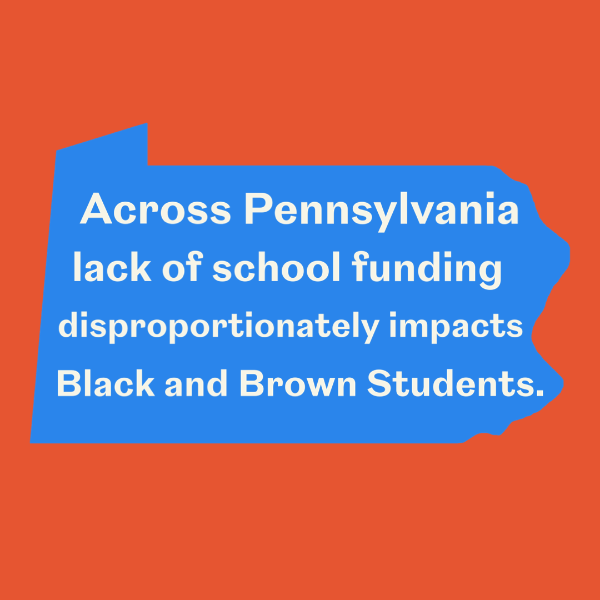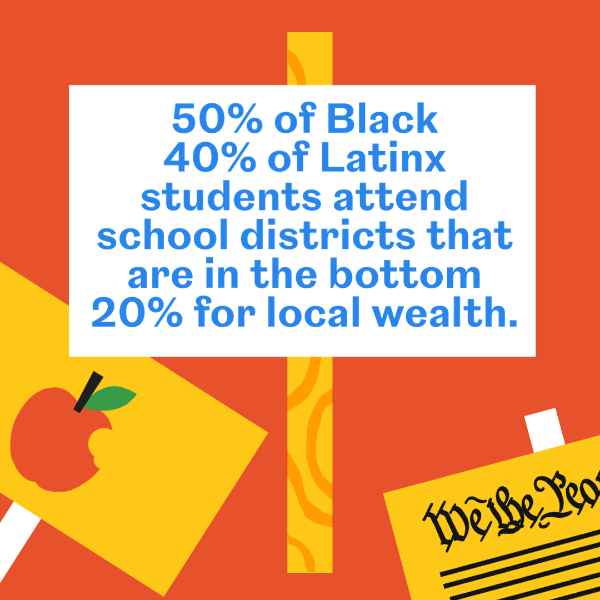
February 19, 2022–We reached a major milestone in the Pennsylvania school funding lawsuit this week, as legislative leaders called their final four witnesses in their case defending our current school funding system.
Daily summaries of each day’s proceedings are now available at FundOurSchoolsPA.org/news
Sign up to receive these weekly summaries in your inbox at FundOurSchoolsPA.org
On Valentine’s Day, the court heard from a witness who had no love lost for teacher unions and other groups he has described as part of the “far-left edu-deep state”: Max Eden, a research fellow at the American Enterprise Institute and the director of the think tank’s Conservative Education Reform Network.
Eden acknowledged, when shown examples of his recent tweets, that he has “pretty strong views” and has used “some pretty adversarial terms” for those he disagrees with. These included suggesting that teachers who teach about gender identity may be doing so because they are trying to “groom” children for molestation, a tweet he said he regretted.
Eden acknowledged that his expert report did not include any of his own empirical research. Petitioners questioned the thoroughness of his review and analysis. They pointed out that the single study he cited on the issue of funding equity — showing Pennsylvania in the middle of the pack in equitable school funding — included an alternative measure indicating that Pennsylvania is the most regressive state in the country in its spending. Eden omitted this second measure from his report.
Dr. Abel Koury, a senior research scientist at the statistical consulting firm Far Harbor LLC, testified Tuesday on his analysis of the relationship between funding levels and districts’ Average Growth Index (AGI), a measure of student progress on standardized tests. His analysis did not find any correlation.
On cross-examination, Koury conceded that he had not considered the possibility that, because AGI is designed to control for factors that teachers and school leaders cannot influence, it may already filter out the effects of underfunding.
Koury praised the research on the relationship between funding and achievement done by economist Rucker Johnson, an expert for petitioners in the case, calling it “super-rigorous.”
On Wednesday, for the second time, a cyber charter school leader testified for respondents: Brian Cote, director of curriculum for 21st Century Cyber Charter School. Cote’s attorney explained that the respondents had called cyber charter leaders to “illustrate that there is another path” for students who are dissatisfied with their experience in their local school districts. The viability of this alternative option was questioned during cross examination. Only 12% of 21st Century’s students are economically disadvantaged, and 0.3% are English learners. The cyber charter’s graduation rate for low-income students is 43%, while the graduation rate for students with disabilities is 51% — both far below the statewide average.

Legislative leaders’ final witness was Dr. Eric Hanushek, an economist, a senior fellow at the Hoover Institution at Stanford University, and a long-time critic of school funding increases. He has testified in 24 previous school funding cases. He criticized a 2007 “costing-out” study commissioned by the Pennsylvania state legislature to determine what level of school funding is needed to allow students to meet state standards. He said he does not believe that any costing-out study is valid because there is insufficient research to establish any relationship between school funding and achievement.
During cross examination, Hanushek acknowledged that he has done no research on the needs of Pennsylvania children. He agreed that students with disabilities, students learning English, and economically disadvantaged students all require more school resources than their peers.
Trial now moves into its final stages. On Tuesday, petitioners will call Matthew Kelly as a rebuttal witness. The Penn State professor, who previously testified as an expert back in November, is expected to be the final witness called in the case.
The court will issue an order in the coming week scheduling any closing arguments and post-trial filings. Following all post-trial submissions, the court will render its decision on whether or not Pennsylvania is meeting its constitutional duty to provide a thorough and efficient system of public education for all students.
“School funding, school resource equity, is an essential investment to advance student achievement.” — Economist Rucker Johnson during his testimony on January 21
Our Daily Summaries and Blog Posts
- Final Respondents’ Witness Discusses ‘Money Matters:’ Dr. Eric Hanushek Testifies, Feb. 17 (Thursday)
- Legislative Respondents Call Final 2 Witnesses, Feb. 16(Wednesday)
- ‘I Can’t Say For Sure How It Would Have Changed Things:’ Analysis Of Funding And Growth Scores Questioned, Feb. 15 (Tuesday)
- Respondents Call A Witness With ‘Some Pretty Strong Views,’ Feb. 14 (Monday)
News Coverage
From pupil counting to plagiarism, Pa.’s school funding trial takes twists during defense phase–WHYY, February 17, 2022
Four takeaways from Pa.’s landmark school-funding trial, two weeks into Republican witnesses –Philadelphia Inquirer, February 11, 2022
Guest opinion: Funding disparities are hindering the quality of our children’s education–Daily Local News, February 14, 2022
Neighboring districts show funding disparities–The Reporter, February 10, 2022
